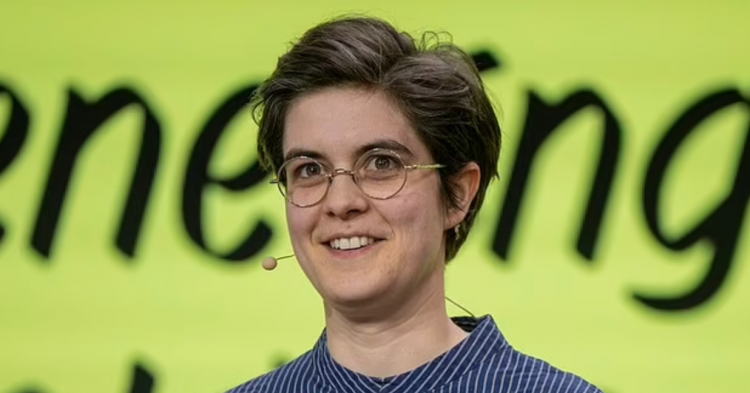Marlene Engelhorn, an Austro-German heiress residing in Vienna, is embarking on a remarkable journey of giving back. Her story is one that challenges the norms of wealth inheritance and taxation, as she seeks to redistribute her substantial inheritance, which she received from her grandmother, Traudl Engelhorn-Vechiatto. In September 2022, Marlene inherited an estimated $4.2 billion, an immense fortune that she believes she acquired purely by chance, referring to it as a stroke of luck in the “birth lottery.” This unexpected windfall prompted her to take action and advocate for wealth redistribution.
Engelhorn’s wealth originates from her family’s historic chemical company, BASF, founded by Friedrich Engelhorn in 1865. The Engelhorn family also owned Boehringer Mannheim, a pharmaceutical and medical diagnostics equipment company, until its sale for $11 billion in 1997. With Forbes estimating the family’s net worth at $4.2 billion, Marlene Engelhorn found herself in a position of immense privilege and power.
However, what sets Marlene apart is her deep-seated belief in the need for wealth redistribution. She openly expressed her dissatisfaction with Austria’s lack of inheritance tax, which was abolished in 2008, making it one of the few European countries without a death tax. In her own words, “I have inherited a fortune, and therefore power, without having done anything for it, and the state doesn’t even want taxes on it.”
This conviction drove Engelhorn to take action even before her inheritance materialized. For over a decade, she actively campaigned for tax policies that would impose heavy taxes on her wealth and promote government-led redistribution. She co-founded “Tax Me Now,” a group of affluent individuals in Germany who advocate for higher taxes on their earnings.
In August 2022, Engelhorn made headlines when she participated in a Millionaires for Humanity event in Amsterdam, where she campaigned for higher taxes on the wealthy. Her dedication to this cause is evident in her commitment to donate approximately 90 percent of her inheritance.
But Engelhorn’s philanthropic efforts do not stop at personal financial contributions. She aims to involve the public in the decision-making process by establishing a citizens’ group known as the ‘Good Council for Redistribution.’ She sent out 10,000 invitations to randomly selected Austrian citizens aged over 16, inviting them to participate in this initiative.
The interested participants can register online or by phone, with 50 individuals ultimately chosen to participate, along with 15 substitutes in case of dropouts. These participants will engage in meetings held in Salzburg from March to June, collaborating with academics and civil society organizations. Engelhorn’s vision is to assemble a diverse council representing various age groups, social classes, and backgrounds.
Engelhorn firmly believes in wealth redistribution, even in the absence of effective political action. She stated, “If politicians don’t do their job and redistribute, then I have to redistribute my wealth myself.” Her hope is to see her wealth put to good use in addressing societal inequalities and injustices.
To ensure inclusivity, the meetings will provide childcare services and cover travel costs, offering each participant $1,300 for each attended weekend. Engelhorn views these discussions as a “service to democracy” and intends to fully entrust her assets to the chosen 50 individuals, emphasizing, “I have no veto rights.” However, in the event that the council cannot reach a decision on how to allocate the funds, the money will revert to Engelhorn.
Engelhorn’s journey is not just about the redistribution of wealth but also about challenging the notion of privilege and acknowledging its role in society. She recognizes that her upbringing in a mansion with privileges like a garden gave her a narrow perspective of the world. She now strives to use her privilege to bring about positive change.
In a video posted by Millionaires for Humanity in May 2021, Engelhorn boldly stated, “Millionaires should not get to decide whether or not they contribute in a just way to the societies they live in, and without which they would never have become millionaires. Social justice is in everyone’s best interest. Wealth taxes are the least we can do to take responsibility. Tax us.”
Engelhorn’s actions have sparked a broader debate on inheritance tax in Austria. The Social Democrats advocate for its reinstatement, while the People’s Party, the current senior coalition partner, opposes it, emphasizing its stance against new taxes and its commitment to increasing net income for citizens.
Marlene Engelhorn’s story is one of profound social consciousness and a commitment to using her privilege for the greater good. Her journey challenges conventional notions of wealth and power, inspiring us to reevaluate our roles in promoting a fair and just society. In a world where wealth often begets more wealth, Engelhorn’s actions stand as a testament to the potential of individuals to effect meaningful change, one substantial inheritance at a time.
